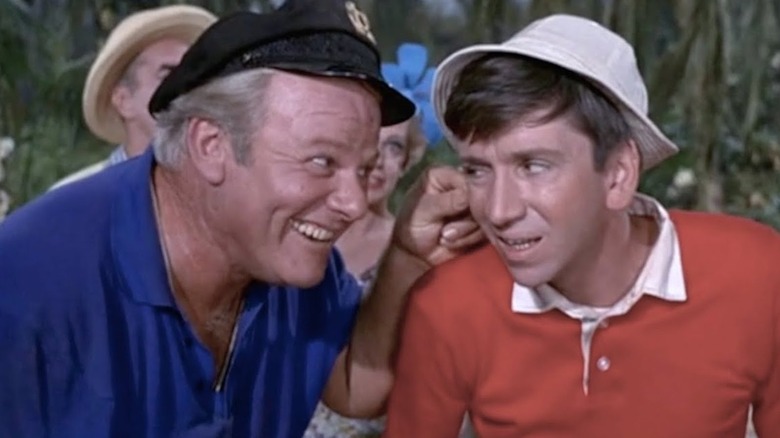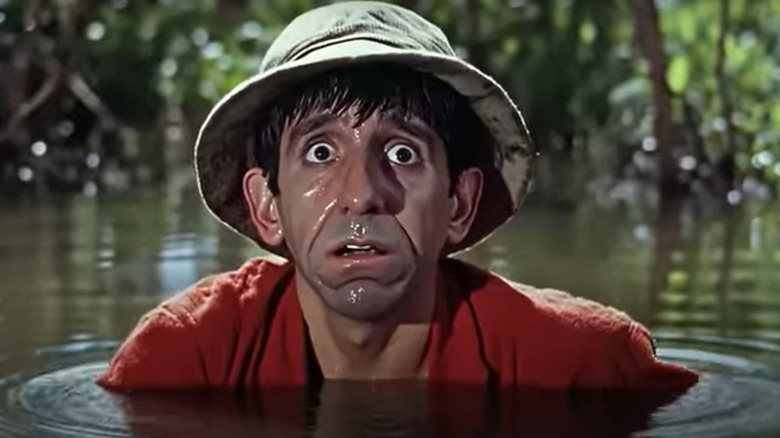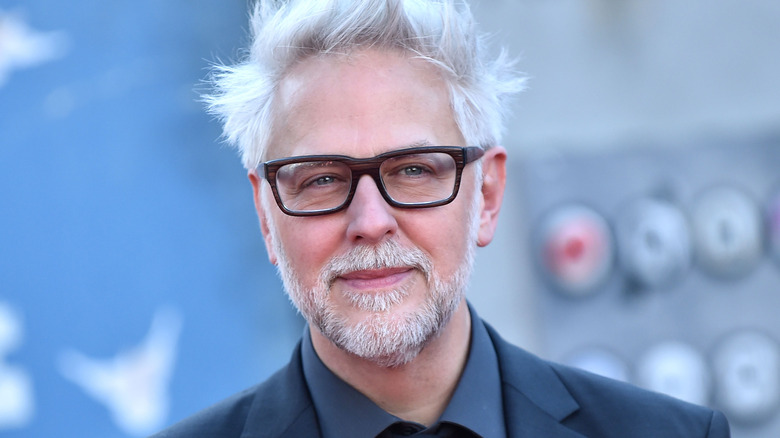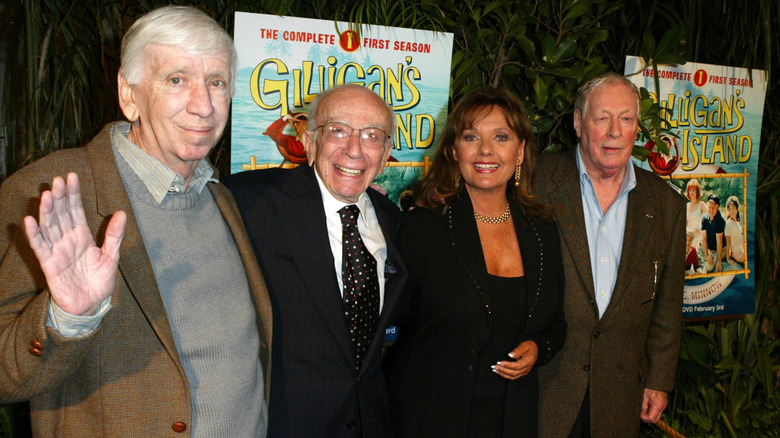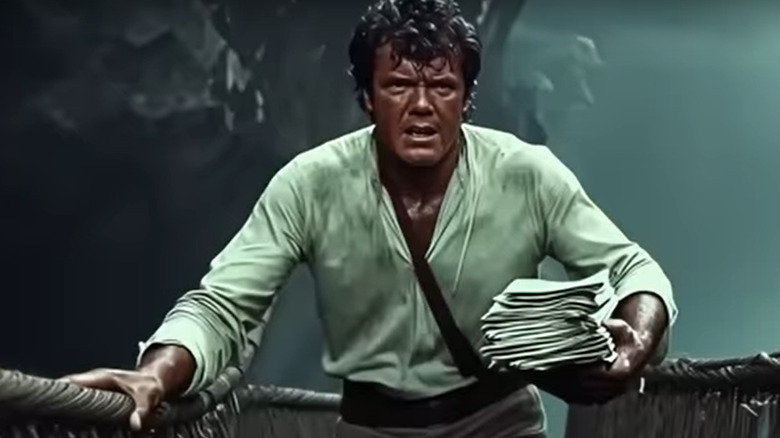The Blumhouse Gilligan's Island Reboot Trailer Is Too Good To Be True
Imagine a scenario where a group of shipwrecked strangers get stranded on a mysterious island and are forced to fend for themselves. Help never arrives and their attempts to return to civilization don't amount to anything. That's the basic story of "Gilligan's Island," a 1960s sitcom that embraces slapstick comedy and promotes the positive idea of people working together to achieve a common goal. In different hands, however, it could have become a survival horror movie where everyone succumbs to madness and evil. What would that look like?
There have been bona fide attempts to reimagine "Gilligan's Island" as a horror movie throughout the years, but they never came to fruition. That said, thanks to the power of artificial intelligence, we can now see what a Blumhouse-produced, scarier take on the story might look like — and let's just say it teases more splatstick than slapstick. With that in mind, prepare to have your wholesome memories of watching "Gilligan's Island" absolutely ruined.
AI created the Blumhouse Gilligan's Island trailer & you'll wish it was real
The trailer for the fake Blumhouse "Gilligan's Island" horror movie, uploaded by TikTok user @richschneider, expands upon some ideas introduced on the original sitcom, albeit with a spooky twist. For example, it discusses an ancient curse and alludes to the Tiki god Kona, who torments the Skipper (Alan Hale Jr.) after he digs up the deity's statue on Season 1's "Waiting for Watubi" episode. However, Skipper's mishaps are mild compared to the horrors that await the cursed characters in the AI-generated trailer.
In this scenario, Gilligan (Bob Denver) is haunted by voices he hears in the wind, which is a storyline what wouldn't seem out of place on "Lost." The faux trailer also reveals that the Skipper is still a superstitious fella, but his inner turmoil is taken to the next level as he keeps having visions about his death. Meanwhile, Lovey (Natalie Schafer), appears to be harboring a dark secret that's intrinsically linked to the curse. These people are doomed.
The trailer also boasts a Grindhouse flavor, echoing stranger-in-peril exploitation movies like "Cannibal Holocaust" and "Island of Death." The controversial nature of AI means that the trailer is bound to polarize some viewers, though it illustrates the horror potential of "Gilligan's Island." However, it's unlikely that we'll see a twisted reboot brought to the screen any time soon.
James Gunn almost rebooted Gilligan's Island as a creepy cannibal movie
Hollywood has a history of making dark reboots of beloved classics. Viewers needn't look further than "Winnie the Pooh: Blood & Honey" and "Fantasy Island" for 21st century examples of this trend in action. As such, it was only a matter of time until someone tried to make a "Gilligan's Island" horror movie, and it would have happened if James Gunn and Charlie Kaufman had their way.
The "Gilligan's Island" reboot idea came from the imagination of Kaufman, who, back in the 1990s, wrote a story about the shipwrecked survivors killing and eating each other. Warner Bros. was on board to bring his twisted vision to life, and Gunn wanted to help out, presumably as a director or producer. Unfortunately, "Gilligan's Island" creator Sherwood Schwartz and his estate shutdown the idea with an emphatic no — twice — and that was the end of that dream.
It's unknown why Schwartz and Co. turned down Gunn and Kauffman's pitch. Perhaps it's because they wanted to keep the sitcom's feel-good legacy intact? Or maybe it's because "Gilligan's Island" is celebrated for being a critique of capitalism, and adding it to Hollywood's cash-hungry remake trend would defeat the purpose? At the same time, the original sitcom's legacy boasts a few dark moments, so throwing a horror movie into the mix is arguably unnecessary.
The real and tragic truth of the original Gilligan's Island
While most viewers associate "Gilligan's Island" with laughs, there is a dark legacy associated with the sitcom. For example, "Gilligan's Island" was influenced by the JFK assassination, as the creation of the original pilot episode coincided with the president's death. To pay tribute to the politician, the American flag was shown at half-mast during the opening credits. The sequence isn't an obvious connection to John F. Kennedy, but it highlights the impact his death had on the sitcom's creators behind the scenes.
Fans will be more upset by the reality of the "Gilligan's Island" cast experiencing tragedies in their personal lives. Russell Johnson, who played the Professor, lost his father at a young age and was sent to a boarding school for orphans. The actor joined the military afterward, and broke his ankle when his plane was shot down during World War II. Furthermore, reports claim that creator Sherwood Schwartz was the only person who received profits from the sitcom's syndication, which impacted cast members like Johnson and Dawn Wells. The latter even launched a GoFundMe in 2018 to help with medical costs and debt payments, as she experienced financial hardships following the recession in the 2000s.
What's more, Tina Louise is the only surviving actor of the main "Gilligan's Island" cast. As such, there are probably many fans of the original sitcom who'd rather remember its stars for their past triumphs, as opposed to seeing them digitally resurrected in controversial AI-centric projects.
Are AI trailers getting out of hand?
"Gilligan's Island" isn't the only classic television show or movie to be reimagined through an AI trailer, nor is it the only one to feature an interesting premise that many people could get behind. AI trailers have presented "RoboCop" as a 1950s movie and reinterpreted "Beetlejuice" as a haunting horror flick, and that's barely scratching the surface. Some of these faux trailers are genuinely entertaining as well, proving that the technology is developing at an advanced rate.
Of course, that's also a cause for concern in a broader sense. Big changes are coming to movies and TV shows because of AI, leading to protests from filmmakers and unions who believe the technology poses a threat to labor. Every trailer that rakes up lots of views and illustrates how effective AI can be is contributing to the problem, and there's a case to be made that they've gone too far.
Elsewhere, studios have explored the idea of incorporating AI into scripts (though the 2023 Writers Guild agreement includes a number of AI-related protections for writers), and the aforementioned trailers prove that it's useful for creating special effects. There's no denying that the technology is a quick and cost-effective way to produce content, but AI will remain a polarizing topic until a suitable compromise is reached on how it should be used.
